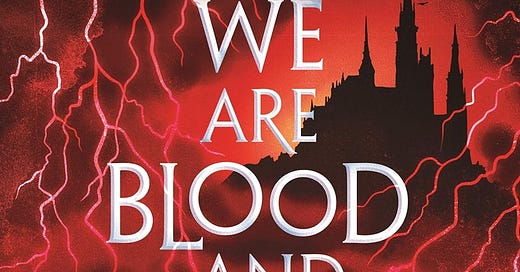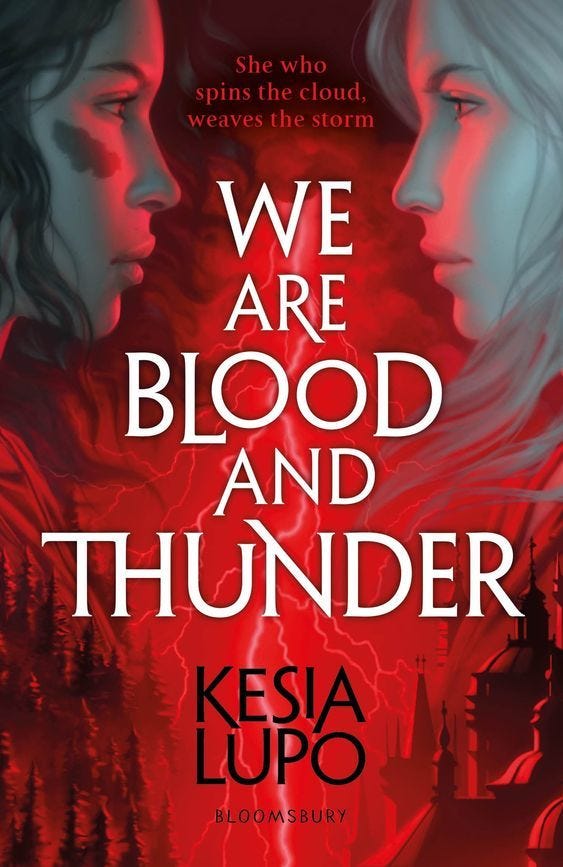Hi everyone,
Hope you’re all enjoying your holidays! Welcome to my sparkly new Substack and thanks for sticking with me through the unwanted transition from TinyLetter, which is shutting down (sob). I’m afraid I’ve lost my letter archive, which can’t be transferred over - so this is a totally clean slate. The aim of this newsletter is to provide any news/updates from my professional life as an author and literary agent AND to tackle a specific publishing-related topic each time. I am always open to suggestions on what that topic should be so please stay in touch and let me know if you have any ideas!
2023 is nearly over and it was a massive year for me. In January I left my job of 8 years as an editor in the UK, packed up my life and moved to the US. I’m so glad I ended up with a job at The Bindery as Associate Literary Agent, starting in May. Staying in publishing! Learning new skills! Working with authors across age-groups and genres! It’s already been a dream come true.
During my decade working in publishing so far, I’ve been fascinated by the differences between the UK and US markets. We share a language and often have bestsellers, major publishers and author brands in common, among other things. But the similarities between our two markets are complicated by some important differences.
In this newsletter, I’ll explore a few key differences and what they might mean for authors.
A little disclaimer: I work fully remotely on the west coast of the US, a long flight from publishing capital, NYC. Plus, I’ve only been here 10 months. So, please take all of this with a pinch of salt! I’d also like to acknowledge the other English-speaking markets around the world, of which there are many but none of which I feel qualified to comment on. I see you!
WHAT DOES MARKET SIZE MEAN FOR AUTHORS?
The most obvious difference between US and UK publishing is the size of their markets. According to IBISWorld, the book publishing industry in the US was worth $40.2bn in 2022. Meanwhile, according to the Publishers Association, the UK publishing industry was worth just under $9bn.
If the UK publishing industry is a quarter of the size of the US industry, the reasonable assumption is that greater opportunities for authors are to be found in the US. I think that’s correct, overall. In terms of earning/sales potential, gaining a publishing contract in the US is definitely a bigger deal.
You might assume that US publishing houses pay bigger advances, too. However, anecdotally I’ve found this point to be untrue – I’m speculating but perhaps a bigger market equals greater competition for those publishing slots. US advances tend to be a bigger, but certainly not four times bigger.
Additionally, it’s worth noting that the UK book industry remains among the largest in the world – fifth after the USA, China, Germany and Japan.
What does this mean for authors? Well, it depends (as with everything!) on your specific circumstances, projects and ambitions. Not every project will work in both markets. But as a general rule getting published in both the US and the UK is very desirable. If you sign with an agent or publisher, I would always advise asking about plans for US/UK rights as a priority.
WHY DO BOOKS SOMETIMES HAVE DIFFERENT COVERS IN THE US AND UK?
For example, here’s my US cover for We Are Blood and Thunder - the only one of my books to be published in both territories - followed by my original UK cover.
Why the difference? Basically, the tastes of consumers differ in the UK and the US. I’d like to avoid generalizing about what the UK and the US markets visually prefer, exactly, as it varies a lot depending on the genre and target age-group (and actually, I feel my example above bucks the trend - in general, US publishers have been more open to depicting characters on the front cover of YA fantasy novels). But UK/US publishers who ‘buy in’ a title from the other market will definitely consider whether the original publisher’s cover will work for their consumers.
Less noticeably, you may pick up on small changes to the text between UK and US editions – Americanization or Anglicization – to ensure the spelling/phrasing/grammar of the novel is in line with expectations and will be understood by readers in each country.
One thing that publishers will try to avoid changing between territories, if possible, is the title. This can be a logistical nightmare in our interconnected online age, as you can imagine! But it does happen - a la Harry Potter and the Philosopher’s Stone (UK) vs Harry Potter and the Sorcerer’s Stone (US).
WHAT ARE THE DIFFERENCES BETWEEN AGENTS IN THE UK AND US?
Frankly, the biggest difference is that US agents are likelier to sell your book to a US publisher, while UK agents are likelier to sell to a UK publisher. However, this is a reflection of contacts and experience available to each agent as opposed to any rules or restrictions on where an agent is allowed to sell.
As a US-based agent with a UK background, I am currently selling more in the UK than the US. Time difference aside, in our digital, connected world I’ve found this to be unproblematic so far. I try to ensure every author I sign has potential in both markets and I go out on ‘simultaneous submission’ with each project, meaning I submit to editors in both territories at the same time. That’s one approach - other agents do things differently. For instance, an agent at a larger agency may have a dedicated international rights colleague who will be able to pitch your book to editors abroad.
As an author, it’s important for you to understand what YOU want out of a publishing deal in order to pick the right agent and agency. Is your book very firmly rooted in a UK setting/story and therefore likelier to appeal to a UK readership? Maybe a UK agent would be your best bet. Do you have ambitions to see your book translated into multiple languages? Choose an agency with a strong international rights agent on board. Is it important to you to meet your agent in person? Choose an agent who lives close enough for you to visit. Everyone’s needs are different!
ARE THERE DIFFERENCES BETWEEN UK AND US EDITORS?
Yes - anecdotally! My impressions are as follows...
US editorial style tends to involve very long and detailed editorial letters. UK editors apparently tend to be more straightforward in style. (Every editor is different though, of course! And there is always a ‘lead’ editor in one territory - i.e. you are likely to do a full structural/line edit with just ONE editor.)
So far, I’d say US editors are marginally more likely to confirm receipt of submissions than UK editors. The policy of ‘if I don’t reply, it’s no’ is a little more common in the UK. (I did this as an editor, too – so no shade on this at all!)
It is harder to find public information on UK editors – the industry feels much more closed at this level and I’ve had to lean heavily on my existing knowledge and contacts to build good submission lists. Meanwhile, US editors tend to be relatively easy to find on their websites or Publisher’s Marketplace.
I’ve maxed out my word count – but I hope this was interesting and helpful! I’m aware it’s far from exhaustive (it’s a surprisingly BIG topic) and if you have questions, please let me know. There could be a part 2 if desired!
All that remains to be said is a big thank you to everyone who has supported me in a myriad of ways this year – I hope you’re all having an amazing festive season! My next newsletter will be all about my agenting ambitions for 2024 including how many authors I’m aiming to sign and what genres I’ll be focussing on…
Happy holidays!
Kesia






Hi, I’m so glad I found this SubStack! I have been wondering specifically about this question on US vs UK publishing for some time now. This was a great post. If you do a part 2, could you discuss which genres are more popular in the UK vs the U.S. market from what you’ve seen?
I’ve been really enjoying the newsletter – thank you. I for one would be really interested in a ‘part two’ on this topic!